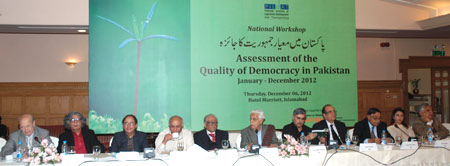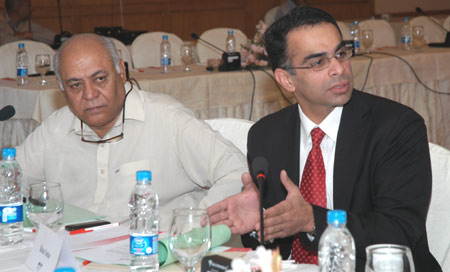|
|
| |
| EVENTS |
|
|
> Continuity of Democratic Process a Positive Sign; Governance Failure a Major Concern: PILDAT Workshop
|
| |
|
PILDAT National Workshop
December 06, 2012
Islamabad
|
|
| |
Islamabad: December 6; While processes that strengthen democracy have been effectively put into work, the ultimate performance of the democracy as it affects the people has not been satisfactory during the year 2012. The Government�s completion of five years term is a milestone in the country�s political history but there is more that needs to be done on the governance front. This was the key view held by members of PILDAT�s Democracy Assessment Group and participants of a national workshop on the �Assessment of Quality of Democracy in Pakistan, 2012.�
The National Workshop was attended by various representatives of different sections of society � such as political parties, MPs, Youth, Labour, Academia, etc. to share their views on the quality of democracy in Pakistan in Year 2012. |
|
| |
Spokesperson of the President and representative of Pakistan Peoples Party (PPP), Senator Farhatullah Babar, said that one of the key parameters of measuring democracy in the country is to assess whether or not the federation has weakened. On that scale, he argued, democracy has improved as pillars of federation have increased over the time. Moreover, he reminded, there has been a massive shift of economic and political power at the lower level. He attributed the past political upheavals to what he termed as the �Manipulated Power Transfer� (MPT) and emphasized that this mere fact that the system was not allowed to destabilize despite the disqualification of one Prime Minister speaks of how strong democracy has evolved in the country. He also brought to attention the positive role of Parliamentary Committees including the Senate Standing Committee on Defence and Defence Productions and National Assembly Standing Committee on Human Rights, which have been at the forefront of suggesting recommendations to the Parliament and Executive.
Representing Pakistan Muslim League (Nawaz) and Secretary General of the party, Mr. Iqbal Zafar Jhagra, said that the �worst form of democracy is better than the best form of autocracy� � a view which was repeatedly endorsed by participants of the workshop. He lamented that people are frustrated and disappointed but these disappointments will hopefully wash away with continuity in the democratic process.
Mr. Haider Abbas Rizvi, representative of the Muttahida Qaumi Movement (MQM), said that it needs to be appreciated that the democratic process was never derailed in the country in the current setup. He said that he would award the Parliament a total of 6.5 out of 10 marks. He also reminded the judiciary is presently powerful in the country.
|
|
| |
Starting off the discussion of the workshop, Dr. Hasan Askari, a renowned academic, said that while continuity of the system for five years, among other processes, that strengthen democracy needs to be appreciated, the issue of social fragmentation in the country needs to be taken into account. He also underlined that the Supreme Court�s assertive role has both positive and negative sides on the impact of democracy in the country. He recommended that the �system should not be distorted, it should be supported.�
Mr. Shahid Hamid, Former Governor Punjab, said that good governance is the most vital thing on assessing democracy. He agreed that whereas the implementation of SC�s judgment enhances the institution�s moral authority, it is hoped that it doesn�t erode with the Court�s assertive role.
Speaking on the issue of media in the country, Mr. Ghazi Salahuddin, columnist, said that one of the key trends in the country has been the rise of social media or what is termed as citizen journalism. He reminded that media�s freedom needs to be ensured in the country which has become a dangerous place for journalists. He agreed that the intellectual and cultural environment of media including the speech and style is a matter of concern, proposing that media needs to �kick start a rationale debate� in the country.
Dr. Huma Baqai, a renowned academic, said that �politics of consensus has become politics of compromise.� She appreciated that it is good that the Pakistan�s democracy is moving beyond the �2-and-a-half-year hitch�, but reminded though that the problems are still solved on the streets instead of in the assemblies. |
|
| |
Sharing the role of political parties in strengthening democracy, Mir Hasil Bizenjo, Senior Vice-President, National Party Pakistan, said that political parties have played a key role in establishing democratic setup in the country, reminding that in the past �thousands of workers were lashed� to ensure installation of a democratic setup. He urged that due place should be granted to political parties who, in the past, helped remove the military rulers out of the power.
Taking part in the discussion, Chairman NADRA, Mr. Tariq Malik appreciated role of Parliamentarians for agreeing to use NADRA database for drawing voters list, reminding that so far 84 million voters have been registered.
Participating in the discussion, Mr. Arif Azhar, President of the Punjab chapter of Awami National Party, said that it was due to political parties that military was being taken out of power.
Mr. Ameer ul Azeem from Jamaat Islami lamented that democracy is taken as a business in the country, urging that performance needs to be improved. |
|
| |
Ms. Shabnam Rukhsana from Pakistan Muslim League said that the worsening law and order situation, inflation, lack of power supply, and foreign policy are all issues which negatively affect democracy in the country.
Ms. Malaika Raza from Pakistan Tehreek Insaf (PTI) recalled that parties in Pakistan are mostly hereditary-based or draw their vote on ethnic lines. This, she said, needs to be shunned.
Ms. Meraj Khan of the Qaumi Watan Party commended the new Voters List and the Code of Conduct for the General Elections, 2013, but added that there is �fear, violence, trafficking, and corruption� in the country.
Mr. Saleem Safi, a noted journalist, said that it is a positive sign that both opposition and Government are tolerating each other. However, the way ideology has withered away from political parties is a cause of concern for democracy, he said. It has been an observation during 2012, he said, that a single person switched from one party to another.
Lt. General (Retd.) Abdul Qayyum said that last five years was a travel on a �bumpy road�, as the country suffered economic disaster and law and order issues.
Lt. General (Retd.) Talat Hussain stated that despite the fact that key political parties in Karachi namely MQM, ANP and PPP are all part of the Government, no effective solution to the violence in the city has been found by the parties who are also stakeholders to the worsening issue in the metropolis. |
|
| |
A participant also shared that democracy in the country should be assessed over its performance on economic end.
The workshop was introduced by PILDAT�s President, Mr. Ahmed Bilal Mehboob, who shared that in Pakistan, democracy can be looked at through two aspects: processes and performances. While process refers to the institutions and rules that make the system work, the performance refers to the output of the processes in the country.
Enlisting the positive trends impacting quality of democracy in the country during 2012, he said that the uninterrupted Parliamentary process, smooth transfer of power from one PM to other, resolution of NRO implementation case, legislation for neutral caretaker governments, timely conduct of the Senate election, greater role of Parliament in national security and foreign policy decisions, internal elections in Pakistan Tehreek-i-Insaaf (PTI) among other issues needs to be appreciated. |
|
| |
He lamented that the assessment of democracy on the performance front has been poor. He shared that the Parliament failed to pass a comprehensive Anti-Terrorism Law and effective law for the Accountability of public officials. He also recalled that the Chairmanship of the Public Accounts Committee has been returned to the ruling party and that the President continues to hold the co-chairmanship of his political party and hosts party activities within the Presidency. Moreover, the rise of sectarian violence, insurgency in Balochistan and target killing in Karachi, poor performance of the economy, corruption and weak rule of law continue to undermine democratic setup, he added.
Summing up the discussion, Justice (Retd.) Saeed-uz-Zaman, Former Chief Justice of Pakistan, said that although there are many laws in the country, they are not implemented across the board. Our guiding principle should be equitable treatment to all, he concluded. |
|
| |
Earlier in the day, PILDAT had conveyed a meeting of its Democracy Assessment Group which was attended by Mr. Omar Khan Afridi, Former Federal Caretaker Minister; Dr. Huma Baqai, Chairperson, Department of Social Sciences; Institute of Business Administration (IBA), Senator Mir Hasil Bizenjo, Senior Vice President, Balochistan National Party; Justice (Retd.) Manzoor Gilani, Former Chief Justice, Azad Jammu and Kashmir; Lt. Gen. (Retd.) Moinuddin Haider, Former Governor, Sindh and former Federal Minister for Interior; Mr. Shahid Hamid, Senior Advocate, Supreme Court and former Governor, Punjab, Senator Javed Jabbar, Former Federal Minister for Media Development; Dr. Hasan-Askari Rizvi, Defence and Political Analyst; Mr. Ghazi Salahuddin, Senior Analyst; Mr. Illahi Bukhsh Soomro, Former Speaker, National Assembly, Mr. Ahmed Bilal Mehboob, President, PILDAT, and Ms. Aasiya Riaz, Joint Director, PILDAT, took part in the DAG meeting. Chairman and member of PILDAT�s Citizens Group on Electoral Process including Justice (Retired) Saeed-uz-Zaman Siddiqui, Former Chief Justice of Pakistan, and Mr. Babar Sattar, lawyer and constitutional expert also participated in the discussion. |
|
| |
The event was facilitated by PILDAT under the project Supporting Monitoring of Democracy, Electoral Reforms and Development of Youth in Pakistan which is supported by the Danish International Development Agency (DANIDA), Government of Denmark. The views expressed by DAG or workshop participants, however, do not represent the views of DANIDA, the Government of Denmark and the Royal Danish Embassy Islamabad. |
|
| |
|
|
| |

|
|
| |
|
|
| |

|
|
| |
|
|
| |

|
|
| |
|
|
| |

|
|
|
|
|
|
|
|
|